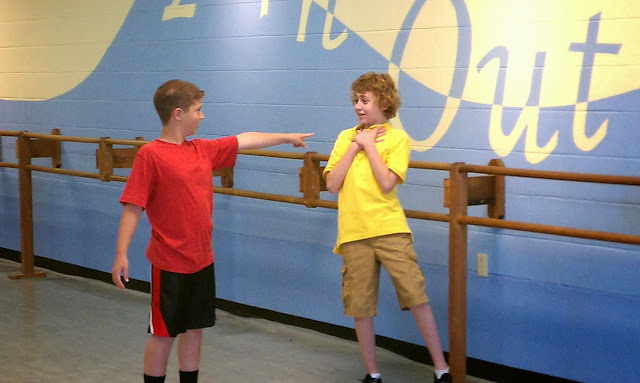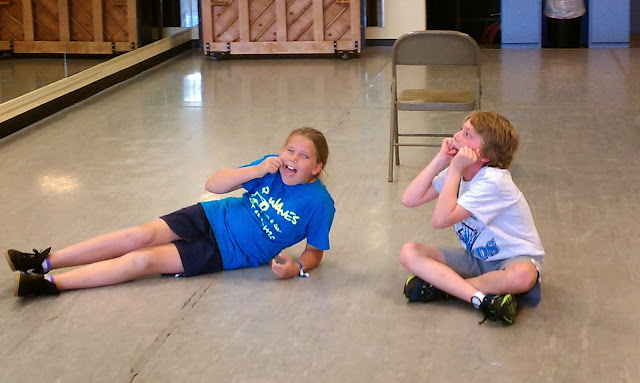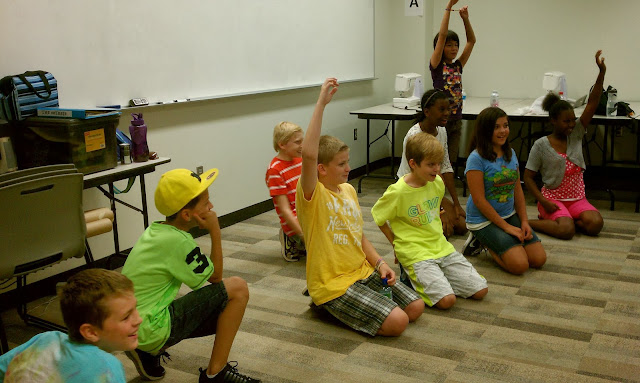"Carrie" has put me in so many emotional and creative places in the last couple of months - places that I haven't been in awhile. The last few years, my creativity has been funneled into writing and directing, but being back onstage has started up the restless engine again, the one that requires much stimulation as fuel. I've been drawing (sometimes on myself) and other various types art-ing, and writing poetry again. I've been amazed by people again. I want to touch everyone and look into their eyes until I see the person they're trying to hide. And I want to be seen again. I've been hiding, and I didn't even know it.
My creativity habit, in recent years, has been me, alone, at a computer, for hours on end. This is punctuated by production meetings once in awhile. I was good with that.
I forgot about backstage. I forgot about onstage. I forgot about holding hands and taking a big breath together and jumping into the water. I forgot about being with people, silently, in the dark, waiting for our entrance cues. I forgot about grasping hands, exchanging glances, and bowing for an audience who is expressing their appreciation.
Now, suddenly, I'm there in it again. And I'm not the only person in the group who makes up songs about whatever is in front of me at the time, or the only one who gets excited about finding feathers and pretty leaves, and thinks, "There must be something I can do with this." I'm not the only one who makes jewelry and raunchy jokes. I'm also not even the best at these things. It is inspiring to be around people who do it better than I.
I forgot that I need to be stimulated, all the time. By people and their wonderful, magical, bizarre, impulsive, generous whims. They feed my Imagination Monster.
And here I thought I had become an introvert. I just forgot.
Wednesday, October 23, 2013
Wednesday, October 16, 2013
Tuesday Restlessness
We've finished two weekends of Carrie the Musical so far, and I've noticed that, starting about Tuesday the following week, I start getting really restless. Irritable. Listless. Lethargic and anxious and almost explosive, all at the same time. That doesn't even make sense, but it's still true. There's a storm brewing inside me.
But why? Obviously, I miss the show and I'm eager to get back. But get back to what? The material? The camaraderie? The attention? The mental/physical/emotional workout of acting, balls to the wall? (Ovaries to the...rosaries?)
This role takes me to ugly places. It isn't "fun." I love it and cherish it, yes, but that's not really the same as having fun with it. But it's allowing me to explore some darkness that I otherwise would not permit myself to express, personally. In that darkness is a lot of vulnerability. It's hard to be vulnerable, especially in such a public way. There's something primal about exposing those raw parts of yourself... and getting to blame the character. It's not me, no. I would never do that. But Margaret... She's vicious.
There's also a lot of energy there, in the dark. It's constructive, in a way. When you're in the dark, your goal is to create light in some form. Sometimes, it just takes grabbing matches, but other times, it requires the furious and unrelenting rubbing of two sticks together, praying for a spark.
It's exhausting.
So I get to Tuesday, and I am without that scary, yet energizing, outlet. And I won't get it for a couple more days. And I'm restless and cranky and sad and lonely. And, if I could just stop sitting around in between-show depression, I would explode.
But why? Obviously, I miss the show and I'm eager to get back. But get back to what? The material? The camaraderie? The attention? The mental/physical/emotional workout of acting, balls to the wall? (Ovaries to the...rosaries?)
This role takes me to ugly places. It isn't "fun." I love it and cherish it, yes, but that's not really the same as having fun with it. But it's allowing me to explore some darkness that I otherwise would not permit myself to express, personally. In that darkness is a lot of vulnerability. It's hard to be vulnerable, especially in such a public way. There's something primal about exposing those raw parts of yourself... and getting to blame the character. It's not me, no. I would never do that. But Margaret... She's vicious.
There's also a lot of energy there, in the dark. It's constructive, in a way. When you're in the dark, your goal is to create light in some form. Sometimes, it just takes grabbing matches, but other times, it requires the furious and unrelenting rubbing of two sticks together, praying for a spark.
It's exhausting.
So I get to Tuesday, and I am without that scary, yet energizing, outlet. And I won't get it for a couple more days. And I'm restless and cranky and sad and lonely. And, if I could just stop sitting around in between-show depression, I would explode.
Monday, October 14, 2013
"How did the show go?"
Actors get asked all the time, "How did the show go?" It's nice that people ask. I know you may be genuinely interested in me and my vocation. I appreciate it, I really do. It doesn't seem like a hard question to answer, but it is. For me, anyway.
There are so many areas of "show" that question could mean: Did I remember all my lines/blocking/props/music/choreography? Did everything go as rehearsed? Did I feel connected to my scene partners? Were there any missed cues? Was there a large audience? Did they enjoy it? Do I feel good about my performance?
"How did the show go?" seems to want a pat answer to all of these questions at once. For me, there are only two levels of performance: "I sucked," and everything else. Choice 1: black. Choice 2: every shade of gray. Both answers have a lot of information and emotion attached to them. Generally, I don't even know how it went anyway. I have no idea how to critique myself anymore. And I don't even know if that's a good or bad thing.
My inclination is to answer all questions honestly, but I don't think most people actually want to hear how the show really went, because the answer can be long and complicated and difficult to communicate. The question is usually a pleasantry, like, "Hi, how are you?" which, usually, really means, "Hi, give me a quick, small-talk answer about your current state of being, I'll respond similarly, and we'll get on with our lives." It's not that we don't care about each other, but we're busy people, and intimacy takes time.
And frankly, when you ask me about the show, I probably don't want to go into any detail anyway. Because I'm pretty much never satisfied with my work. But I can't really tell you that, because then you feel you have to give me some kind of pep talk, and that's not a necessary burden for you to have to carry.
So, "How did the show go?"
It was great. Thank you for asking.
There are so many areas of "show" that question could mean: Did I remember all my lines/blocking/props/music/choreography? Did everything go as rehearsed? Did I feel connected to my scene partners? Were there any missed cues? Was there a large audience? Did they enjoy it? Do I feel good about my performance?
"How did the show go?" seems to want a pat answer to all of these questions at once. For me, there are only two levels of performance: "I sucked," and everything else. Choice 1: black. Choice 2: every shade of gray. Both answers have a lot of information and emotion attached to them. Generally, I don't even know how it went anyway. I have no idea how to critique myself anymore. And I don't even know if that's a good or bad thing.
My inclination is to answer all questions honestly, but I don't think most people actually want to hear how the show really went, because the answer can be long and complicated and difficult to communicate. The question is usually a pleasantry, like, "Hi, how are you?" which, usually, really means, "Hi, give me a quick, small-talk answer about your current state of being, I'll respond similarly, and we'll get on with our lives." It's not that we don't care about each other, but we're busy people, and intimacy takes time.
And frankly, when you ask me about the show, I probably don't want to go into any detail anyway. Because I'm pretty much never satisfied with my work. But I can't really tell you that, because then you feel you have to give me some kind of pep talk, and that's not a necessary burden for you to have to carry.
So, "How did the show go?"
It was great. Thank you for asking.
Thursday, October 10, 2013
Letter to the Parents of my Dramarama Playwrights
10-8-13
Hello, Dramarama families!
I want to tell you about an observation I made yesterday, regarding your remarkable students.
As I'm sure you are aware, students are now sharing their work with the class, and receiving feedback from classmates. Instead of "that's good" and "that's bad," we use the phrases "What worked for me..." and "What confused me..." Sometimes, it's hard to hear that something you've created could use some improvement, and I often see the light dim in the eyes of the student who is sharing, but it only lasts maybe a minute. Then they immediately see changes they could make, pick up their pencils and start crossing things out and rewriting with enthusiasm. It's pretty awesome to see.
Last night, immediately after class, I attended an evening of play readings by adult playwrights. There was a Q and A session after each short play with the playwright, and all audience members received comment cards, on which they could give written feedback to the playwright about their plays. I was in charge of collecting the feedback cards at the end of the evening, and handing them to the playwrights, so I was there when they each started reading through the audience's comments.
One playwright scoffed at the comments he read about his short play. Although he asked, on his card, if certain elements were "confusing," when people responded that they didn't understand his play, or indeed, they were confused by this or that, he literally said, out loud and rather mockingly (most of the audience had left by this time), "'Oh, I'm confused!' 'It didn't make sense!' 'I don't understand it!' Well, tough. It is absolutely clear. It's theater. Get over it." This upset me greatly, because he asked for feedback, then rejected all non-positive statements out-of-hand, as person after person told him that they didn't understand what he was attempting with his script.
I understand that egos are fragile and that it's hard to hear criticism. But he asked, and if he wants to improve communication with his audience, he'd listen.
On the way home, I suddenly juxtaposed this guy's reaction to honest feedback with our young playwrights' reactions to theirs. And I was incredulous at how much more willing these young people are to take the input and get back to work, striving to be better writers.
Your children are inspiring me. I wanted you to know that.
Thank you-
Tara
Hello, Dramarama families!
I want to tell you about an observation I made yesterday, regarding your remarkable students.
As I'm sure you are aware, students are now sharing their work with the class, and receiving feedback from classmates. Instead of "that's good" and "that's bad," we use the phrases "What worked for me..." and "What confused me..." Sometimes, it's hard to hear that something you've created could use some improvement, and I often see the light dim in the eyes of the student who is sharing, but it only lasts maybe a minute. Then they immediately see changes they could make, pick up their pencils and start crossing things out and rewriting with enthusiasm. It's pretty awesome to see.
Last night, immediately after class, I attended an evening of play readings by adult playwrights. There was a Q and A session after each short play with the playwright, and all audience members received comment cards, on which they could give written feedback to the playwright about their plays. I was in charge of collecting the feedback cards at the end of the evening, and handing them to the playwrights, so I was there when they each started reading through the audience's comments.
One playwright scoffed at the comments he read about his short play. Although he asked, on his card, if certain elements were "confusing," when people responded that they didn't understand his play, or indeed, they were confused by this or that, he literally said, out loud and rather mockingly (most of the audience had left by this time), "'Oh, I'm confused!' 'It didn't make sense!' 'I don't understand it!' Well, tough. It is absolutely clear. It's theater. Get over it." This upset me greatly, because he asked for feedback, then rejected all non-positive statements out-of-hand, as person after person told him that they didn't understand what he was attempting with his script.
I understand that egos are fragile and that it's hard to hear criticism. But he asked, and if he wants to improve communication with his audience, he'd listen.
On the way home, I suddenly juxtaposed this guy's reaction to honest feedback with our young playwrights' reactions to theirs. And I was incredulous at how much more willing these young people are to take the input and get back to work, striving to be better writers.
Your children are inspiring me. I wanted you to know that.
Thank you-
Tara
Wednesday, October 9, 2013
Friday, October 4, 2013
Thursday, October 3, 2013
Come see me in "Carrie The Musical"
I have the tremendous pleasure of playing Margaret White, Carrie's mother, in the Egads Theatre production of Carrie The Musical. It's a fantastic and super-challenging role that I am deeply grateful to be working on.
For more information, go to the show website.
Tuesday, October 1, 2013
"The Unusuals"
The Coterie's
Funny Bones class
Grades 5-7
At first, they looked like a regular improv class.
But we soon found out that they were exceptional.
They dared to take risks.
They worked together, and learned quickly to say "yes" to their scene partners.
They astounded us with their dedication and humor, and they decided to name themselves.
Meet "The Unusuals."
Don't Change that Channel! class
The Coterie's
Don't Change that Channel!
Grades 3-5
To create a "television show," it takes a lot of planning...
...a lot of collaborating...
...a lot of observation...
...and, of course, a commercial break...
...before you can go "on the air"...
...and triumph in your own game show! ...or sports show... or police drama... or cooking show...
You Too Can Run the Zoo! class
The Coterie's
You Too Can Run the Zoo!
Grades 2-4
This is a very dedicated group of fictional-animal lovers!
First, we have to decide what we need for our zoo.
And, of course, we're going to need maps for the visitors.
Celebrating our successful invisible-animal-capture adventure!
Funny Bones Improvisation Class
The Coterie's
Funny Bones Improvisation Class
Grades 5-7
This class moves pretty quickly, so I could only get decent photos when they were sitting down!
Gibberish Translator: Interviewing a person who speaks an unknown language is a tricky situation.
Eager volunteers!
Improv class is the only place where you are encouraged to pick up hitchhikers.
Yep, just another day in improv class.
Coterie's Theatrical Makeup Class
Theatrical Makeup
Grades 4-7
Design and Application
Uh...someone had better call the zoo and see if they're missing anything...

He said he was in sixth grade, but he's looking a little scruffy. Maybe I should check his ID.
Monet's Water Lilies
Who knows where you'll find inspiration?
Theatre Sampler, spring 2013
Theatre Sampler
Grades 2-4
In this class, we explore a different area of theatre each week, including:
Makeup Design...
...Stage Makeup Design Application...
...and Stage Combat.
(Turnabout is fair play!)
This Is Not a Box (Coterie)
This Is Not a Box
Grades K-1
It's just a box, right? No, it's not!
It's a train...
It's a house...
It's a hidey-hole...
It's a car...
Subscribe to:
Posts (Atom)



















































